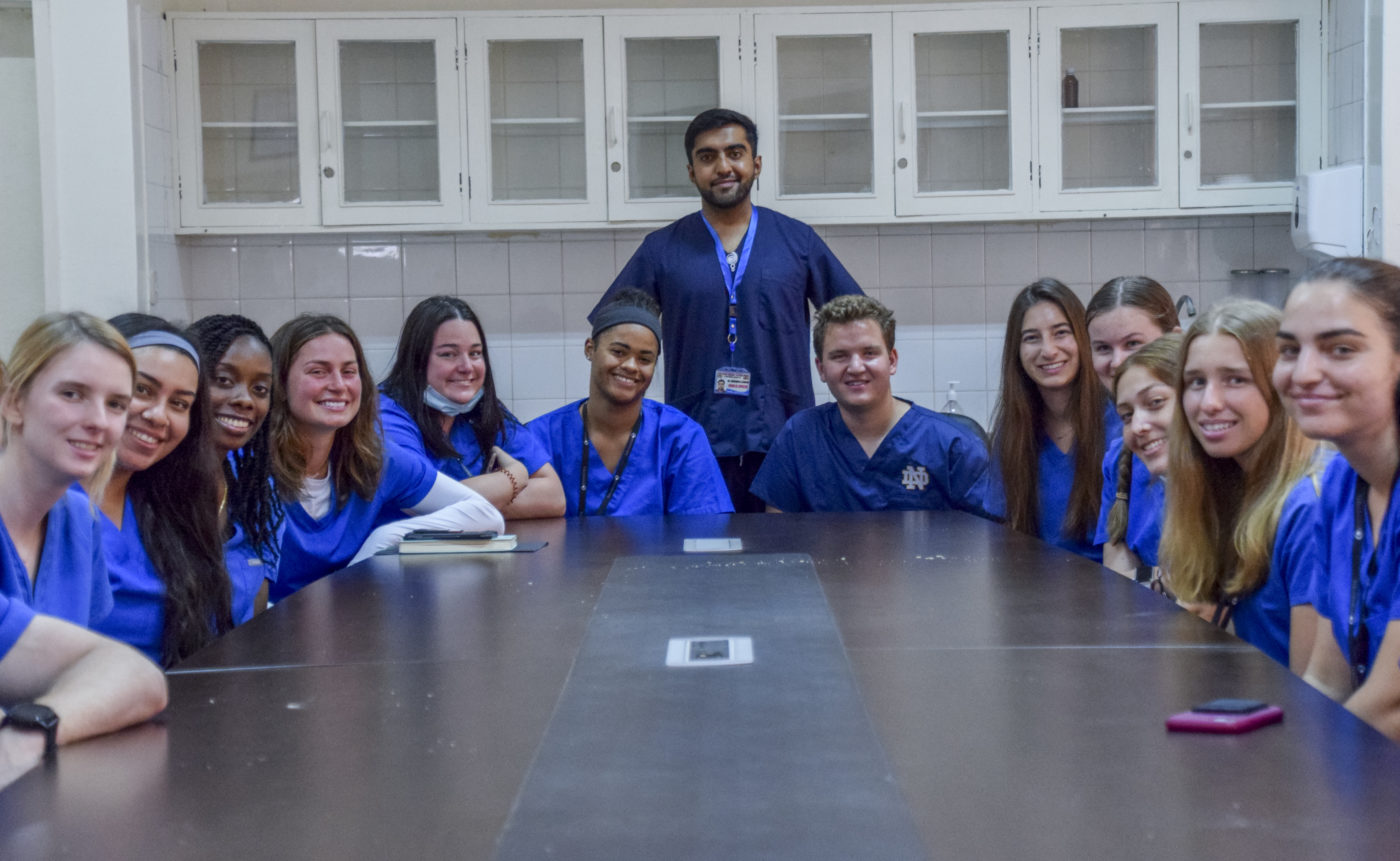There’s a lot that goes into becoming a physician assistant. We’ve talked about how to earn patient care hours for PA school without a certification through a pre-PA internship with International Medical Aid. We’ve reviewed the different jobs that can qualify as patient care experience hours. We’ve covered the upcoming name change from Physician Assistant to Physician Associate. And we’ve discussed the average PA salary in 2021.
Becoming a PA-C is a wonderful career choice. Working under the supervision of a doctor, PA-Cs evaluate, diagnose, and treat patients. They also prescribe medication, order tests, and read test results. PA-Cs work in various clinical and hospital settings, helping people everywhere. So, if you decide to become a PA-C, you’re heading into a rewarding career.
We’re talking about the best pre-physician assistant majors for future PAs. We’ll dispel some myths regarding the best educational route for you to take. We’ll help you understand how to pursue your interests while setting yourself up for success as a physician assistant major.
Finally, we offer pre-PA internships and PA school admissions consulting. So, if you get stuck or have questions you need answered, don’t hesitate to contact us. International Medical Aid is here to help you reach your dreams.
Your Pre-PA Major
Contrary to popular belief, your pre-PA major isn’t the only factor in whether you get into PA school. Admissions committees will consider what you have studied. But they’ll also examine whether you’ve completed the required prerequisite courses. They’ll care about your grades, GPA, healthcare experience hours, and patient care experience hours. So, don’t kill yourself by taking the most challenging courses to prove yourself!
What should my major be?
You might still wonder what your major should be. Perhaps you love science and have always wanted to major in Biology. Maybe Physics or Chemistry is your thing. Or maybe you love literature, horticulture, business administration, or philosophy. There are a multitude of subjects you can choose to study. And guess what? Any of the subjects we just mentioned – and countless others – are perfectly acceptable majors for pre-PA majors.
There are specific ways to set yourself up for success as a physician assistant major while studying your favorite topics. After all, you’re the one earning the degree. Shouldn’t your undergrad studies focus on what you love? For example, you can immerse yourself in business classes while preparing for PA school.
Here’s how.
Take science courses for your electives.
While you can pick your major, you must take some science courses to prepare for PA school. Because of this, we recommend taking all your pre-requisite courses as electives. Don’t know what prerequisites you’ll need to take? We suggest picking out several different PA schools and looking at their prerequisites. This information will be listed under the Admissions section of the school. Prerequisites are generally listed with GPA and grade requirements.
Here are some of the most common prerequisite courses:
- Anatomy
- General Chemistry
- Physiology
- Microbiology
- Statistics
- General Psychology
Take extra classes between degrees.
You might have seen the word “post-baccalaureate” floating around the academic world. This word refers to classes taken after you’ve earned your bachelor’s degree but before you begin your graduate studies as a physician assistant major.
You can take these classes as a non-degree-seeking student at the same university from which you earned your bachelor’s degree. You can also check with the university where you want to earn your PA-C title if it’s a separate university. Or, you can choose a different school altogether. Requirements for post-baccalaureate classes vary by institution. So, you’ll need to research what courses to take and where to satisfy those requirements most easily. It’s a semi-complicated process to go through. But it’s achievable.
Challenge yourself, and have fun.
You might feel torn between taking electives and enrolling in a post-baccalaureate program. Both have their upsides. However, taking as many prerequisites as possible for your elective courses will save you time and money. These courses will challenge and prepare you for the courses you’ll take as a physician assistant major.
But there’s still another option. If you are equally passionate about your undergraduate major and becoming a PA, you can always double major for your bachelor’s degree. But keep in mind this option would be very time-consuming and expensive.
Taking prerequisites as electives or enrolling in a post-baccalaureate program would be less expensive and time-consuming. But if you’re passionate about both topics, a dual degree might be the perfect option. Reach out to our admissions consulting team if you’re having trouble deciding. We can help you sort through the details to make your decision easier. We can also recommend some different programs to you
Popular Science Pre-PA Majors
Of course, some students love science and want to major in a science or health-related field. It’s great if that’s what you want to do. Here are some of the most popular fields of study for physician assistant majors.
- Anatomy
- Biology
- Chemistry
- Healthcare Ethics
- Mathematics
- Medical Terminology
- Microbiology
- Physiology
- Statistics
Over half of all students who become physician assistant majors also choose a health or science-related undergrad major. This is because many future PA-Cs are passionate about science and medicine, and it’s what they want to study.
If you have any questions or concerns about science or health-related pre-PA majors, feel free to contact us. IMA talks to thousands of students about this topic, and we’d be happy to help you.
Choosing a Competitive Major
It’s a common – but incorrect – assumption that choosing a science-related major makes you more competitive. But it doesn’t. Your grades, GPA, health care experience hours, and patient care experience hours matter as much, if not more, than your major. What matters most is showing passion for what you do and gaining the necessary experience to become a great PA. And that’s what admissions committees care about when they review applications.
The truth is, there isn’t any specific major that will make you a more competitive applicant. It’s a strong application that will get you into a PA program. Let’s talk about your application.
Submitting A Competitive Application
If you want to be as competitive as possible, you’ll want to submit a strong application. A strong application starts with a complete PA application. In this section, we’re breaking down the application.
A complete PA application includes:
- GPA
- GED or High School Diploma
- GRE Score
- Healthcare experience hours
- Patient care experience hours
- Interview performance
GPA for PA School
To be a strong applicant for a physician assistant major, you’ll want to have at least a 3.5/4.0 GPA. An even higher GPA will make you even more competitive. Schools will look at your overall GPA, undergraduate GPA and science GPA. Showing dedication to your coursework early on sets a great track record. If you do well in your undergraduate studies, you will likely do well in your physician assistant major. Our point? Work hard to earn good grades. It will pay off!
GRE Score
The Graduate Records Examination, or GRE, is a test required of most students who have completed their undergraduate studies but have not yet begun their graduate studies. Most graduate programs want to see students pass the GRE. Why? Because the exam is designed to assess readiness for graduate school. Earning your bachelor’s degree shows great promise, but it doesn’t mean you’re ready for a graduate program. Many students study for and take their GRE during their senior year of college.
You’ll likely need to take the GRE to be admitted into any PA program. There are some exceptions, though. For example, some schools allow you to take the MCAT instead of the GRE. Whether that’s an ideal alternative is a personal decision. However, taking the GRE will open the doors to most PA programs. Taking the MCAT will only allow you admission into some programs.
Health Care Experience
We recommend exposing yourself to healthcare settings early on. Volunteering in a clinical or hospital setting is a great way to start. Your volunteer experience will look great on your application and help you determine if the medical field is right for you. Plus, most of this time will likely count for healthcare experience hours.
Patient Care Experience
Every PA program differs but requires hours of patient care experience. These hours are different from health care experience hours. Healthcare experience hours involve most of the work done in a medical setting. Filling out paperwork often counts for these hours. However, to qualify for patient care experience hours, your time needs to involve direct, supervised interaction with patients. These hours are critical. Without them, you won’t get into a PA program.
Interview Performance
Your interview will also determine whether you’re accepted as a physician assistant major. Most schools use the traditional or MMI interview formats.
Both have their pros and cons, which we’ve covered in detail. Many students enjoy the diversity that an MMI setting offers. It can be nice to think about your answer for a few minutes. But some students prefer the traditional setting. They’re prepared to go in-depth on any part of their application. In this case, the traditional interview can be very rewarding.
Of course, you won’t get to choose what kind of interview you get unless you only apply to schools that use the traditional interview format or to schools that utilize the MMI interview format. Filtering what programs you apply to might limit your choices, though. You’ll need to consider what’s most important to you carefully.
Let us know if you need help preparing for your interview. Our PA school admissions consulting includes interview prep.
IMA Can Help
As you can see, many factors influence whether you’re accepted into a PA program as a physician assistant major. Consider all of those factors as you prepare to become a physician assistant. As we said before, it’s a very rewarding career. It allows you to practice medicine in a variety of settings. But it also spares you from the years doctors spend in residency and fellowship.
Is it all a lot to take in? We understand. There are lots of steps to take to cover all your bases. The PA school admissions consulting we offer at International Medical Aid can help you. Our team of experts will work with you to strengthen your application. Contact us today to get started.
We wish you the best of luck applying to PA programs. It’s not quite as demanding as medical school, but you still have to work for it. We recommend starting early. Taking your time will help you create an impressive application.

Enhancing Your Pre-PA Application Beyond the Major
Extracurricular Involvement and Leadership
Strong academic performance is only part of the equation. Admissions committees are increasingly looking for well-rounded applicants who demonstrate leadership, community involvement, and a passion for healthcare. Engage in extracurricular activities that allow you to develop these skills—joining a pre-med club, volunteering in community health programs, or taking on leadership roles in student organizations. Such experiences enrich your resume and provide valuable talking points during interviews.
Research and Internship Opportunities
Participating in research projects or securing internships related to healthcare can significantly boost your application. Research experiences demonstrate your ability to work in a rigorous scientific environment and contribute to advancing medical knowledge.
Additionally, internships—particularly those focusing on patient care or healthcare management—provide firsthand experience and can sometimes even count toward required experience hours. Consider seeking opportunities at local hospitals, research institutions, or through programs offered by organizations like International Medical Aid. These experiences can help clarify your career goals and give you a competitive edge during application.
Developing Communication and Interpersonal Skills
Effective communication is a cornerstone of successful patient care. In addition to strong academic credentials, PA programs look for candidates who can communicate clearly, work well in teams, and exhibit empathy. Consider taking courses or workshops in public speaking, conflict resolution, or interpersonal communication. Participating in group projects and community service can also help build these skills. Moreover, strong communication skills will serve you well during interviews—whether in a traditional format or Multiple Mini-Interview—and throughout your career as a healthcare provider.
The Future Outlook for Physician Assistants
Changing Role of PA-Cs in Healthcare
The role of Physician Assistants continues to expand as healthcare systems seek to improve access to quality care. PA-Cs are increasingly stepping into roles beyond clinical duties, such as managing healthcare teams, participating in policy development, and leading research initiatives. This evolution means that your choice of pre-PA major can influence your long-term career trajectory. A solid scientific foundation, combined with complementary experiences in leadership or research, can prepare you to take on these multifaceted roles.
The Impact of Technology and Innovation
Advances in medical technology and digital health are transforming patient care. As a future PA, you may be called upon to work with telemedicine platforms, electronic health records, and data-driven treatment protocols. Staying informed about these technological trends is essential.
Consider incorporating courses or certifications in health informatics, data analysis, or even coding into your academic plan. These skills can help you adapt to the rapidly changing landscape of healthcare and position you as a forward-thinking professional ready to embrace innovative practices
Addressing Healthcare Disparities
A growing focus on healthcare equity influences every medical education and practice aspect. Understanding the social determinants of health and the challenges underserved communities face is becoming increasingly important. By selecting a pre-PA major that includes public health, sociology, or even global health coursework, you can develop the sensitivity and knowledge needed to address these disparities. This focus enhances your application and aligns with the mission of organizations like International Medical Aid, which are dedicated to improving global healthcare access.
Strategies for a Successful Pre-PA Journey
Mapping Out Your Academic Path
Creating a clear academic roadmap is essential. Start by identifying the prerequisite courses required by the PA programs you’re interested in, and plan your schedule accordingly. Consider using academic planning tools or consulting with an academic advisor to ensure you meet all requirements without overloading yourself. A well-organized academic plan allows you to balance rigorous coursework with extracurricular activities and personal interests, creating a strong foundation for your PA application.
Seeking Mentorship and Guidance
Connecting with mentors—whether they are current PA-Cs, physicians, or academic advisors—can provide invaluable guidance throughout your pre-PA journey. Mentors can offer insights into the application process, help you navigate challenging coursework, and provide encouragement when you face setbacks. Many institutions also offer formal mentorship programs that pair pre-PA students with experienced professionals. These relationships can help you refine your career goals and make informed decisions about your major and extracurricular activities.
Embracing Lifelong Learning
Becoming a Physician Assistant does not end with admission to a PA program. Healthcare is an ever-evolving field, and a commitment to lifelong learning is crucial. Stay current by attending workshops, seminars, and conferences related to healthcare and medical education.
Engage with professional organizations and subscribe to industry publications to keep abreast of new research, technological advances, and policy changes. This proactive approach benefits your current studies and prepares you for a successful, dynamic career in healthcare.
Integrating Passion and Preparation
Choosing the right pre-PA major is a deeply personal decision that should reflect your passions and professional goals. While there is no one-size-fits-all answer, the key is to build a strong academic foundation, gain diverse experiences, and continuously seek opportunities for growth and learning.
Whether you opt for a traditional science major or a non-traditional field, your success as a future PA will depend on your ability to integrate your knowledge with practical experience and strong interpersonal skills.
By taking advantage of interdisciplinary programs, embracing new educational technologies, and focusing on academic and extracurricular excellence, you can create a compelling application that stands out in today’s competitive environment. With thoughtful planning and dedicated effort, you will be well-prepared to navigate the rigorous PA admissions process and ultimately excel as a Physician Assistant.
International Medical Aid is committed to supporting your journey every step of the way. Our comprehensive admissions consulting services, internship opportunities, and global health initiatives are designed to help you achieve your dream of becoming a PA-C. As you continue to build your academic profile and gain hands-on experience, remember that your unique combination of skills, passion, and determination will ultimately define your success in healthcare.
Embrace the challenge, stay focused on your goals, and take advantage of every opportunity to learn and grow. Your commitment today will pave the way for a fulfilling and impactful career as a Physician Assistant, where you can make a real difference in the lives of patients and communities around the world.
Do you still have more questions about the career of a physician assistant? Check out the other articles we’ve published on our blog.
- How to Get Patient Care Hours for PA School (Without a Certification)
- 10 Reasons Why Being a PA was Named the Best Overall Job in 2021
- Physician Assistant (PA) Salaries in 2021
- Physician Assistant to Physician Associate: What You Need to Know
- PA Program Requirements: The Ultimate Guide
- Factors Affecting Physician Assistant Salaries
- Highest Paid Specialties for Physician Assistants
- Getting into PA School: 8 Tips for Aspiring PA Students








